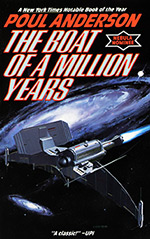
![]() always1957
always1957
2/25/2012
![]()
As Poul Anderson's good friend Gordon R. Dickson says in The Final Encyclopedia, since the beginning mankind has dreamed several dreams of how things could be better, and these dreams have led to all the inventions and progress that mankind has made. One of these dreams has been the elimination of death.
This is a big dream, because as far as we know, death pretty much comes to everybody and there is no way to stop it. In classical times, we dreamed of the immortal gods. In fantasy, we dream of immortal folk like elves. And there have been many such dreams in SF, from the anti-agathic drugs in Blish's Cities in Flight, the rejuvenations of Julian May's Pliocene and Milieu trilogies, and the Howard Families of various of Heinlein's novels.
In the case of The Boat of a Million Years (the title comes from The Book of Going Forth by Daylight, more popularly known as The Eqyptian Book of the Dead), certain rare human were just born with the gift of immortality. Not only do they not die, but they remain young, and most wounds heal very quickly. But they can be killed and immortality does not always protect them from heartache.
The first part of the book reads like an alternate history novel. However, it isn't one, because there is no known divergence between our time-line and the one in the book. The oldest Survivor, Hanno, was a Phoenician sailor from Tyre who was born around 1000 BC and at the start of the book took a trip to Norway around 310 BC. Unlike most stories of this kind, Hanno tends to avoid great historical figures, because of the necessity to not be discovered for what he is.
As the years go by, Hanno and the other Survivors that arise try to find each other, since it becomes painful to make friends and marry, only to find your loved ones dead too soon by your standards. And of course, they must tread carefully among the waves of history and they sometimes find themselves at cross-purposes.
Sometime around the year 1975 AD, the eight Survivors are almost exposed. By this point, Hanno has started a research project to study their condition, so they decide to reveal themselves to the world, and shortly, a variation of their immortality becomes available to everybody.
But this new immortality leads to a world where the Survivors don't seem to fit in or have purpose in life. Consequently, they pull strings to form an interstellar expedition to another star.
I can highly recommend the beginning part to all who like history or alternate history stories. The part about the interstellar expedition is likely a question of taste: I liked it well enough, but would not rave about it. But all in all, a solidly satisfying work from Master Anderson.